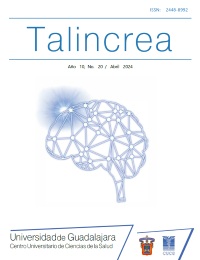CONCEPTUALIZATION OF MATHEMATICS ANXIETY
DOI:
https://doi.org/10.32870/talincrea.v11i2.193Keywords:
statistical anxiety, fear of mathematics, gender, intelligence, learning difficultiesAbstract
Statistics anxiety represents a considerable challenge for a notable proportion of university students, particularly those in social science disciplines, where it can significantly undermine academic performance, encourage avoidance of statistics-related subjects, and erode self- confidence. This study focuses on the complex interaction between gender, intelligence, and levels of anxiety experienced towards statistics in a sample of 125 first-year undergraduate students in the field of health sciences in Mexico. Employing a concurrent mixed methodology, a quantitative ex post facto design was combined with qualitative lexical analysis of perceptions of mathematics, using Raven's Progressive Matrices Test and the revised SAS-R scale. Quantitative findings confirm a significant inverse relationship between intelligence and statistical anxiety (higher intelligence, lower anxiety). In addition, gender emerged as a significant predictor, with female participants reporting higher levels of anxiety, suggesting the influence of sociocultural factors and stereotypes. Qualitative analysis revealed a spectrum of perceptions toward mathematics, from viewing it as logical and rewarding to perceiving it as complex or a stimulating challenge. These results underscore the need for tailored pedagogical approaches to address these variables and mitigate anxiety.





